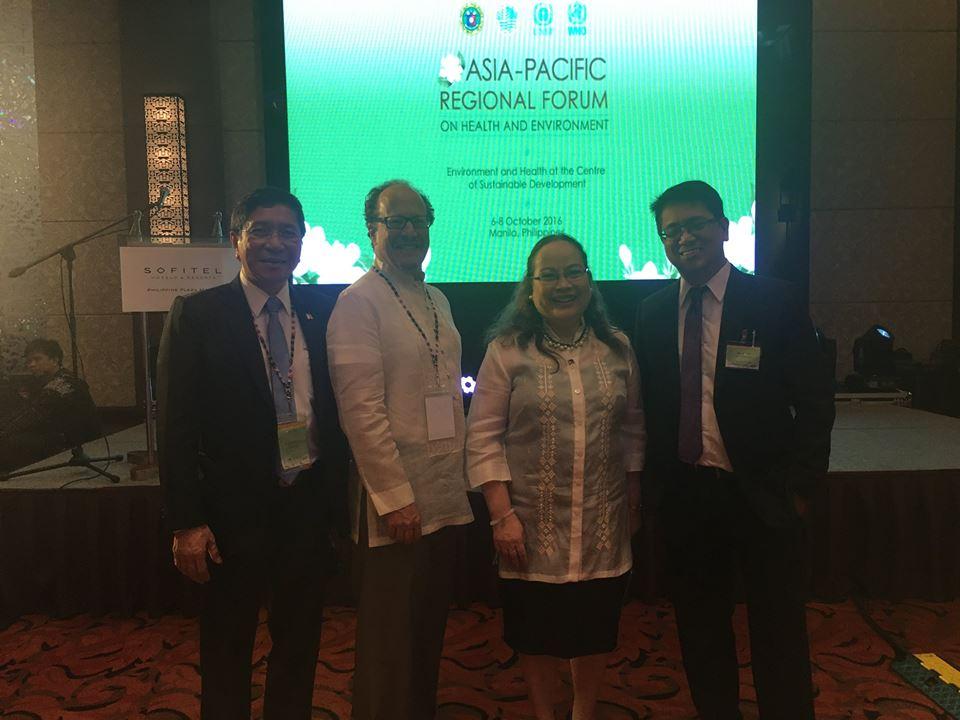Manila, Philippines — Health Care Without Harm Asia supports the governments of over 30 countries, who have gathered recently for the Asia Pacific Regional Forum on Health and Environment, on their collective pledge to intensify efforts and collaboration to protect public health from the impacts of climate change, as well as other pressing environmental health issues.
Asia Pacific ministers of health and environment and health gathered to tackle environmental issues affecting public health
Member states of the Regional Forum, together with several other participating countries from Southeast Asia and the Pacific, have recognized the need to strengthen the synergies between health and environment sectors in tackling issues from climate change and air pollution to safe water, sanitation, and hazardous chemicals, in pursuit of the Sustainable Development Goals (SDGs).
The Manila Declaration on Health and Environment
The output of the three-day forum, the Manila Declaration on Health and Environment, outlined the multinational commitment to adopt sustainability measures to address environmental health issues. Section 7 of the Declaration summarizes the measures that will be implemented by participating countries:
a. Ensure availability and sustainable management of water and sanitation for all.
b. Take urgent action to combat climate change and its impacts – realize the health benefits of mitigation actions by ensuring clean air for health and well-being; prevention of the recurrence of transboundary haze; orient development and public health systems to become more climate-resilient.
c. Substantially reduce the number of deaths and illnesses from hazardous chemicals and air, water, and soil pollution and contamination – environmentally sound management of chemicals and all waste products throughout their life-cycles; substantial reduction of waste through prevention, reduction, recycling, and reuse.
d. Reduce the adverse per capita environmental impact of cities – focus on air quality and the integrated management of municipal and other waste sources; protection against vector-borne diseases such as dengue and malaria.
e. And, protect the health of the working population.
Equipping health care to be low-carbon and climate-resilient
HCWH's Ramon San Pascual and Josh Karliner with Philippine Department of Health Secretary Paulyn Ubial and Underecretary Gerardo Bayugo
The effects of climate change on peoples’ wellbeing was a central topic during the three-day forum. In his presentation, Health Care Without Harm’s International Director of Program and Strategy Josh Karliner emphasized how investing in low-carbon and climate-resilient health care aligns with the SDGs.
“The medical journal, The Lancet, has warned us that the gains we made over the last 50 years on health and developments will be reversed because of climate change. But, we can be anchors of transformational change and lead by example by investing in green, low-carbon, and climate-resilient health care.”
“The discussions during the past three days of the forum showed that our governments now recognize that in order to address climate change, mitigation is as crucial as resilience. We are extremely hopeful that this will also lead to the strengthening of health systems to becoming low-carbon and resilient,” said HCWH Asia Director Ramon San Pascual.
“Rather than just simply being the ambulance at the bottom of the cliff, ministries of health must look upstream and advocate for clean sources of energy, healthy housing, environmental protection, and active transport to name a few of the areas that have enormous influence on our health. In this era of sustainable development, the health sector has to reinvent itself as a champion of the Sustainable Development Goals,” said Philippine Department of Health Secretary Paulyn Jean Rossell-Ubial.
The tri-annual Asia-Pacific Regional Forum on Health and Environment was established in 2007 to jointly tackle the pressing issues of climate change, air pollution, safe water, sanitation and health-hazardous chemicals in pursuit of health and sustainable development.
